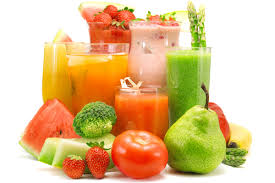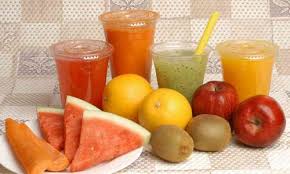Some Facts About 100% Fruit Juice

There are no added sugars in 100% juice - just the natural sugars found in whole fruit.
100% juices are nutritious naturally, or when fortified with nutrients like vitamin C, calcium and vitamin D.
While the calorie content can vary slightly from juice to juice, most 100% fruit juices have only 60-80 calories per 4-ounce portion.
The 2010 Dietary Guidelines for Americans recommend consumption of several cups of fruits and vegetables per day, and acknowledge the role that 100% juice can play as part of the fruit allowance.
100% juice is considered a "nutrient dense" beverage - per calorie, it packs more nutritional value than other beverage choices.
100% juices contain naturally-occurring phytonutrients - compounds found in fruits, vegetables and other plants that researchers believe have disease-preventative and disease fighting properties.
According to the latest consumption data collected by the US Centers for Disease Control and Prevention (CDC). the majority of America's children and teens are drinking 100% fruit juices in amounts recommended by health professionals.
Looking Beyond Calories

Because nutrition is more than just calories, it's important to look at the whole picture when assessing the value of a food or beverage. 100% fruit juices are a source of key nutrients like folate, vitamin C and potassium. In fact, the 2005 Dietary Guidelines Advisory Committee noted that levels of these essential nutrients are often higher in certain 100% fruit juices than in their whole fruit counterparts.
While many of juices' nutritional benefits are readily displayed on the Nutrition Facts Panel, all juices provide value beyond what is visible on the label. 100% juice is an ample source of phytonutrients - compounds in fruits, vegetables and other plants that have disease-preventative and disease-fighting potential. Although this benefit is not listed on the label, there is strong support for the role fruits and vegetables play in reducing disease risk.
Calcium-fortified juices can provide an excellent source of calcium in the diet, particularly for those who are lactose-intolerant. Some juices are now fortified with vitamin D as well, another key nutrient for bone health thanks to its role in helping the body absorb calcium.
In addition, research shows that drinking 100% fruit juice is associated with a more nutritious diet overall. Studies suggest that appropriate consumption of 100% juice is linked to an overall healthier eating pattern, including reduced intake of total dietary fat, saturated fat and added sugars. In addition, drinking 100% juice is associated with increased consumption of whole fruit and is not linked to decreased milk consumption in children.
There are no added sugars in 100% juice - just the natural sugars found in whole fruit.
100% juices are nutritious naturally, or when fortified with nutrients like vitamin C, calcium and vitamin D.
While the calorie content can vary slightly from juice to juice, most 100% fruit juices have only 60-80 calories per 4-ounce portion.
The 2010 Dietary Guidelines for Americans recommend consumption of several cups of fruits and vegetables per day, and acknowledge the role that 100% juice can play as part of the fruit allowance.
100% juice is considered a "nutrient dense" beverage - per calorie, it packs more nutritional value than other beverage choices.
100% juices contain naturally-occurring phytonutrients - compounds found in fruits, vegetables and other plants that researchers believe have disease-preventative and disease fighting properties.
According to the latest consumption data collected by the US Centers for Disease Control and Prevention (CDC). the majority of America's children and teens are drinking 100% fruit juices in amounts recommended by health professionals.
Looking Beyond Calories
Because nutrition is more than just calories, it's important to look at the whole picture when assessing the value of a food or beverage. 100% fruit juices are a source of key nutrients like folate, vitamin C and potassium. In fact, the 2005 Dietary Guidelines Advisory Committee noted that levels of these essential nutrients are often higher in certain 100% fruit juices than in their whole fruit counterparts.
While many of juices' nutritional benefits are readily displayed on the Nutrition Facts Panel, all juices provide value beyond what is visible on the label. 100% juice is an ample source of phytonutrients - compounds in fruits, vegetables and other plants that have disease-preventative and disease-fighting potential. Although this benefit is not listed on the label, there is strong support for the role fruits and vegetables play in reducing disease risk.
Calcium-fortified juices can provide an excellent source of calcium in the diet, particularly for those who are lactose-intolerant. Some juices are now fortified with vitamin D as well, another key nutrient for bone health thanks to its role in helping the body absorb calcium.
In addition, research shows that drinking 100% fruit juice is associated with a more nutritious diet overall. Studies suggest that appropriate consumption of 100% juice is linked to an overall healthier eating pattern, including reduced intake of total dietary fat, saturated fat and added sugars. In addition, drinking 100% juice is associated with increased consumption of whole fruit and is not linked to decreased milk consumption in children.
Source - fruitjuice facts


